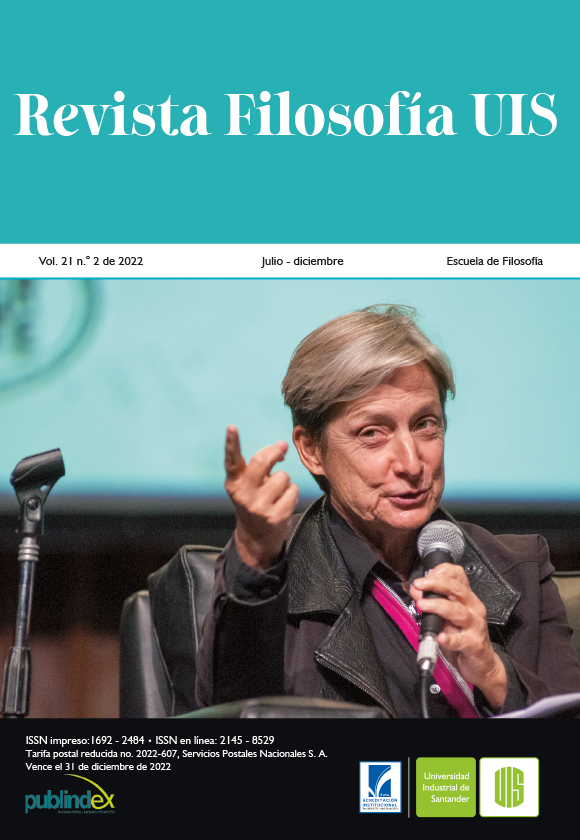The Unheimlich and his Capacity to «Detonate» our Hermeneutical Condition
Published 2022-07-01
Keywords
- Unheimlich,
- Dasein,
- sinister,
- body,
- estrangement
- pathology ...More
How to Cite
Copyright (c) 2022 Revista Filosofía UIS

This work is licensed under a Creative Commons Attribution 4.0 International License.
Abstract
When it comes to thinking about what is most immediate to ourselves, it is necessary to go to what we are as Dasein. However, the experience of the immediate has the condition of presenting itself in the form of an estrangement, a «not knowing». It will be seen that corporeity and its estrangement open the possibility of a hermeneutics of our own condition because the experience of the Unheimlich is a path of epojé that «detonates» (bursts) the habitual chain of meanings and reconfigures the experience. I will take as a point of reference four iconic cases: 1) the convalescence of Oliver Sacks, 2) the famous Paul Schreber case, 3) the reference to the young schizophrenic in the Zollikon Seminars, and even 4) the collapse of Heidegger between the years 1945-46. All of this considering the estrangement of the intimate and the possibility that this opens to an «internal rearrangement». In short, pathologies, and the terrifying that accompanies them, can generate the conditions of an unusual vitalism. Only those who have faced the most radical convulsion of all their truths will be able to "make their way" amid the excess of donation that overflows its «reality».
Downloads
References
- Biblia de Jerusalén (2009). J. Á. Ubieta (Ed.). Desclée de Brouwer.
- Borges, J. L. (2001). Ficciones. El Mundo.
- Braunstein, N. A. (Ed.). (1988). A medio siglo de El malestar en la cultura de Sigmund Freud. Siglo XXI Editores.
- Capps, D. (2004). John Nash’s delusional decade: A Case of Paranoid Schizophrenia. Pastoral Psychology, 52(3), 193-218. https://doi.org/10.1023/B:PASP.0000010023.58529.95
- Carpentier, A. (1994). El reino de este mundo. Editorial de la Universidad de Puerto Rico.
- Cortázar, J. (1982). El sentimiento de lo fantástico. Universidad Católica Andrés Bello.
- Cortázar, J. (1999). Historias de cronopios y de famas. Alfaguara.
- Deleuze, G. & Guattari, F. (2004). Mil mesetas. Capitalismo y esquizofrenia (J. Pérez Vásquez, trad.). Pre-textos.
- Fuchs, T. (2007). The Temporal Structure of Intentionality and Its Disturbance in Schizophrenia. Psychopathology 40(4) 229-235. https://doi.org/10.1159/000101365
- Grondin, J. (2003). Introducción a Gadamer. (C. Ruiz-Garrido, trad.). Herder.
- Heidegger, M. (1994). Conferencias y artículos. (E. Barjau, trad.). Ediciones del Serbal.
- Heidegger, M. (1995). Introducción a la metafísica. (Á. Ackermann, trad.). Gedisa.
- Heidegger, M. (2013). Seminarios de Zollikon. (Á. Xolocotzi Yáñez, trad.). Herder.
- Heidegger, M. (2014). Caminos de bosque. (H. Cortés & A. Leyte, trads.). Alianza Editorial.
- Husserl, E. (1980). Experiencia y juicio. Investigaciones acerca de la genealogía de la lógica. (J. Reuter, trad.). Universidad Nacional Autónoma de México.
- Illescas, M. D. (2014). La vivencia del cuerpo propio en la fenomenología de Husserl. En Á. Xolocotzi Yáñez & R. Gibu Shimabukuro (Eds.). Fenomenología del cuerpo y hermenéutica de la corporeidad (pp. 15-34). Plaza y Valdés Editores.
- Kouba, P. (2015). The Phenomenon of Mental Disorder. Perspectives of Heidegger’s Thought in Psychopathology. Springer.
- Lothane, Z. (1995). El caso Schreber: una revisión. Revista de la Asociación Española de Neuropsiquiatría, 15(53), 255-273. https://www.revistaaen.es/index.php/aen/article/view/15424
- Luna, J. L. (2020). Implantes tecnológicos y experiencia del cuerpo propio. Un análisis fenomenológico. En Ó. Donato, D. Muñoz y Á. Rivera (Eds.). Redefinir lo humano en la era de la técnica: Perspectivas filosóficas (pp. 91-103). Universidad Libre.
- Sacks, O. (1998). Con una sola pierna. (J. M. Álvarez Flórez, trad.). Anagrama.
- Sacks, O. (2019). El hombre que confundió a su mujer con un sombrero. (J. M. Álvarez Flórez, trad.). Anagrama.
- Schreber, D. P. (1999). Memorias de un enfermo nervioso. (R. Alcalde, trad.). Perfil Libros.
- Sloterdijk, P. (2006). Venir al mundo, venir al lenguaje. Lecciones de Frankfurt (G. Cano, trad.). Pre-Textos.
- Sloterdijk, P. (2012). Has de cambiar tu vida. (P. Madrigal, trad.). Pre-Textos.
- Sloterdijk, P. (2019). Crítica de la razón cínica (M. Á. Vega Cernuda, trad.). Siruela.
- Spinoza, B. (2005). Ética demostrada según el orden geométrico. Trotta.
- Xolocotzi Yáñez, Á. & Tamayo, L. (2012). Los demonios de Heidegger: Eros y manía en el maestro de La selva negra. Trotta.

